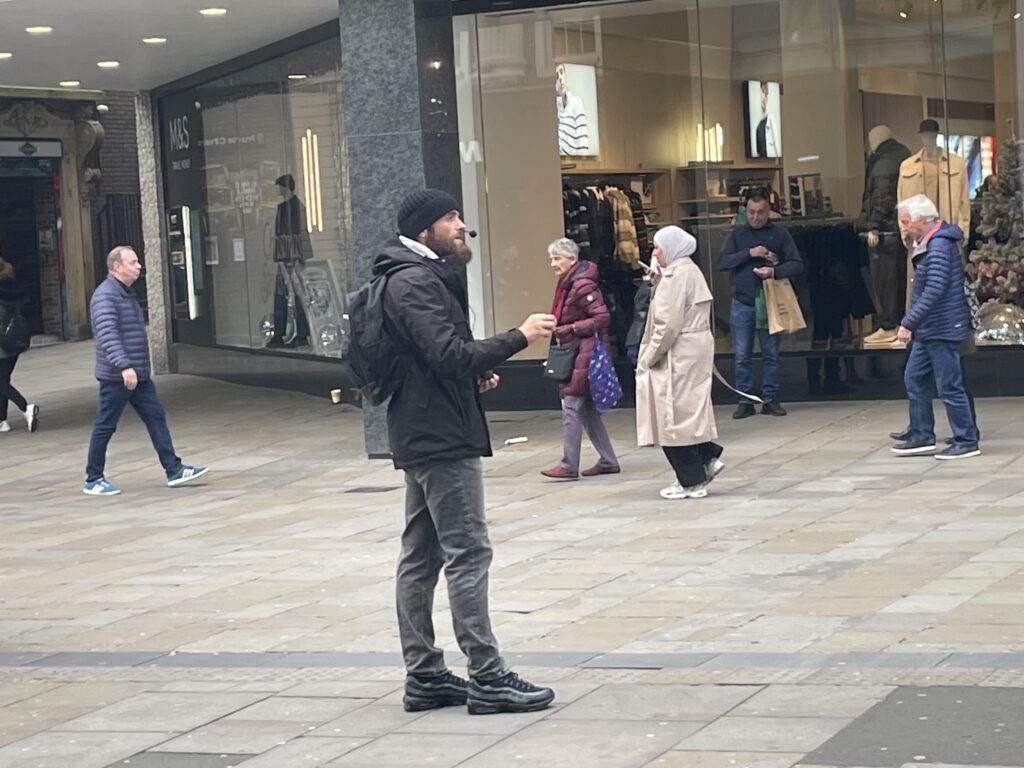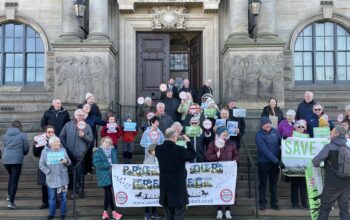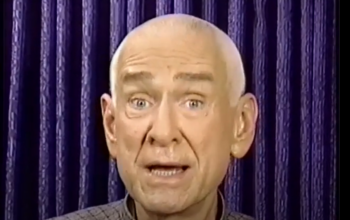Opinion: Street Preachers Do Not Overstep Public Boundaries- Here’s Why
Are street preachers crossing the line, or are they simply exercising their right to be heard?
Picture this: you’re walking down Northumberland street in Newcastle city centre on a Friday morning; the jackhammers create tiny seismic waves, the buskers are playing their tunes, the Fenwick’s Christmas windows are blaring “The Twelve Days of Christmas” for the millionth time; and the busy people and traffic noise of the midday rush is ever present.
Suddenly, like the roar of Godzilla, you hear the booming voice of a person speaking through a handheld speaker wrapped around their neck; saying “JESUS CHRIST IS COMING BACK”; overwhelming and filling the little silence that’s left of the monotony of the routine noise.
You cannot help but glance at who could ever gather, the courage, in our modern day and age, to preach so confidently and publicly about what they believe in.
“Couldn’t be me” – you think to yourself.
Even for a moment, the words the preacher proclaims gets you ever so slightly thinking about what the second coming of Jesus would look like, or who He even is for that matter.
Either way, love them or hate them, street preachers are passionate people.
However, because we are indeed human, we can’t help but feed onto our already prebuilt stereotype on street preachers.

You may have thought it was the most annoying thing ever, and it absolutely ruined your morning. Depending on who you ask, reactions are different to street preachers. Some, like myself, admire the work they do; as it aligns a lot with my beliefs. Others however, cannot stand the mere sight of them.
Curtis Brownie, a street preacher who founded the group OSXKM speaks about why he does what he does, which gives us an insight into the thought process of street preachers, and addresses the stereotypes around street preachers:
In the grand scheme of things however, we’ve never really spent a minute to think much about what passes through their minds, or perhaps that they are in fact human too, with a burning passion, much like us. I think the main question of debate around street preachers is; do they overstep public boundaries?
Where Does Open-Air Preaching Come From?
To understand why people would go out of their way to face public backlash, scrutiny and hurls of abuse, we need to understand where the idea of open air preaching comes from in the first place.
The practice traces back to Jesus Himself, where in numerous instances in the Bible, Jesus thought it most appropriate to preach the Gospel out in the open, in front of hundreds of spectators who have never heard His message, to spread the message of the Gospel and by that regard, spread the news of the new covenant between man and God.

Evidences of this can be found in Luke 6:17-49, where Jesus preached publicly for the first time.
The open air preaching He did is known as “The Sermon on the Plain”.
Similarly, in Matthew Chapters 5,6 and 7, Jesus also publicly preached, which is known as the Sermon of the Mount.
Jesus himself therefore used open air preaching as a way to reach people who have not yet come across his message.
Therefore, if we tie this to why street preachers may be incentivised to preach. Across Great Britain, 46% of people identified as being Christian, 38% said they had no religion, according to the house of commons library. 38% of the population is 17,105,631 people, which is a lot of people that according to Curtis, need to hear the message of the gospel.
What about the tone they sometimes use?
You may have heard some street preachers say things like “if you do this, you’ll go to hell”. While hearing condemnation isn’t the nicest thing, there is a reasoning behind it. It’s really not personal.
In Mark 16:15, Jesus used open air preaching as a way to warn people about sins and their consequences, and described hell as the “gnashing of teeth”, painting a putrid image of Hell. So to spread the message of redemption, He told his disciples to “go into the world and proclaim the gospel to the whole creation”. Jesus obviously never condemned anyone during his existence, but through his preaching, he did warn as to what may lead to it.
This essentially, is what builds the foundation of street preaching. To warn the masses about impending doom, and how to save themselves. Exactly what Jesus taught.
So this tradition can be seen as a common thread running throughout the bible. This can be specifically viewed in the book of acts, where Jesus’s disciples went on a massive journey to preach the gospel; which for some meant leading to their deaths.
Do Street Preachers Overstep Boundaries?
Arguably the biggest question surrounding street preaching- do they overstep public boundaries?
Throughout history we have observed that open air preaching, not just of a religious nature, but also political, as always being a way of expressing passionate viewpoints to the public, with the end goal of rallying support for a particular cause.
In a modern day context, no better example of old-fashioned public preaching is served than Speakers Corner in London, has possibly the most ancient, long standing tradition of public preaching since 1872. Ever since, its been a place where people of all kinds of different views, ideologies and religions can come together to debate and exercise their full democratic freedoms.
If we look at street preaching from this angle, would it not actually serve as a way of exercising democratic freedoms? Would it also not help in promoting healthy public dialogue and discussion? Street preaching, if we look at it from this angle, actually serves as a brilliant example as to the ways freedom of speech may be exercised. After all, in a democratic society we so proudly boast in living in, wouldn’t you want to make your voice heard?
For the passer-byes, the content that is being preached may come across as alienating, offensive or condemning. A vast majority of people may not share the beliefs of the preacher, some may very well believe the direct opposite, and may actually find that some points raised by the speaker are contradictory to their own belief systems.
If we look at the way in which preaching is conducted, it isn’t so much a public speech, but rather you’ll find that In most cases, street preachers actively engage with the public. This essentially means that street preaching isn’t really a monologue, but actually a voluntary exchange; at least that’s what it’s intended for. Objectively, the freedom of choice comes the fact that the passer-by can freely ignore or engage with the topic at hand. So why not engage? Ask that burning question.
Asking the difficult questions not only strengthens one’s opinion, but it widens knowledge.
Most street preachers are fully aware of the impact of their words. Though they exercise free speech, they still remain accountable to laws like hate speech. Open discussion and debate on beliefs don’t fall under hate speech as long as they don’t target groups in a defamatory/slanderous way. However, with faith being a sensitive area for many, religious messages can be perceived as offensive or targeted at certain groups depending on the listener.

However, despite it being challenging, a way to grow one’s faith would be to directly confront these challenging ideas, and through dialogue, could reinforce ones belief systems and actually come out of a discussion with a much more informed belief, as opposed to following something blindly. This serves as an interesting perspective on public preaching in a wider context. How are we to reinforce our beliefs if we can’t answer difficult questions? Surely through dialogue, or even listening to views that contradict our own, we can strengthen our beliefs.
As Curtis pointed out, many street preachers are motivated by compassion for humanity. They share their message out of a personal conviction, with the intent of sharing a way in which they overcame their sinful ways to better their lives in one way or another. Overall, their messages are usually based upon their own experiences with struggle and faith. Whether or not we agree, if we believe our path is the true path to redemption, and a genuine proven way to change your life for the better, wouldn’t you feel compelled to share in whichever way possible? You can attach that train of thought with street preachers, who feel the best way to share their message is through open public speaking.
Ending remarks
In a final thought:
Street preaching, even if it doesn’t make your mornings any easier or quieter, shouldn’t be considered as an infringement of pubic boundaries. We live in a democratic society, and the free exchange of ideas is part of that frame, and what has essentially shaped and re-modelled that frame for centuries. We, as part of that society, should most definitely be able to express our own beliefs as openly and as honestly as we wish (so long as it isn’t hate speech). Perhaps we could even learn something from street preachers.
So, next time you encounter a street preacher, consider pausing for a moment to reflect on the message, maybe even start a conversation to understand their perspective. Perhaps take a moment to reflect on the courage it takes to publicly share deeply held beliefs. Whether or not you agree, a respectful society values diverse voices.
What do you think of street preachers? Do they overstep public boundaries? Join the discussion in the comments below!




Thank you for writing this post. I like the subject too.
Very nice post. I just stumbled upon your weblog and wanted to say that I have truly enjoyed surfing around your blog posts. After all I will be subscribing to your feed and I hope you write again soon!